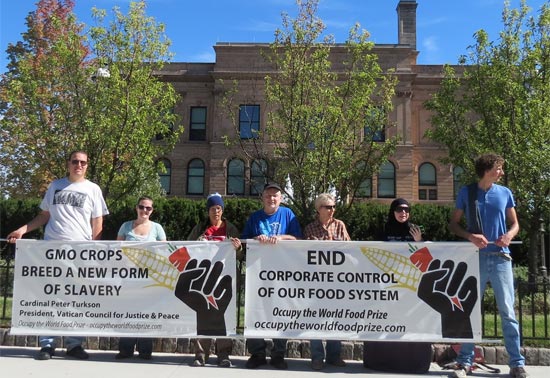Testy panel discussion shows no middle ground in GMO issue
By Ken Roseboro
Published: October 31, 2013
Category: GMO News
 Protests marked the World Food Prize, which was given to top executives from agrichemical giants Monsanto and Syngenta.
Protests marked the World Food Prize, which was given to top executives from agrichemical giants Monsanto and Syngenta.
Photo courtesy of Occupy Des Moines.
To access all the articles in this month's issue of The Organic & Non-GMO Report, SUBSCRIBE NOW.
Supporters and opponents clash over GMO health risks, impact on farmers, and labeling
A recent panel discussion over the risks and benefits of genetically modified foods offered a good example of how polarized the GMO issue is. Six agriculture and food experts based in Iowa—where GMO crops dominate farming—expressed opposing views and disagreed sharply over whether GMOs benefit or harm farmers, consumers, and the world.
The debate, titled “GMOs: Possibilities and Perils,” was organized by the Des Moines Register as part of the activities of the World Food Prize, which was given to three biotechnology industry executives—a controversial move opposed by many consumer groups.
Unbalanced panel, anti-GMO audience
The panel wasn’t balanced with four of the panelists expressing support for biotechnology and two opposing. However, the audience favored the opponents as indicated by applause for panelists who criticized GM foods.
Gary Munkvold, professor of seed science at Iowa State University, argued that GM crops have benefitted farmers, consumers, and the environment.
“There is a high rate of adoption of GM crops, and they’ve added $100 billion to the bottom lines of farmers,” he said, adding that the perils of GMOs were theoretical.
Micheal Owen, professor of agronomy and weed management extension specialist at Iowa State University, said that the pest resistance now seen in GM Bt crops is not due to genetic engineering or pesticides but to farmers’ management decisions.
Bill Horan, a conventional farmer and past chairman of the Iowa Corn Growers Association, said that growing GM crops has given him more time, which has helped him be a better father and husband.
Organic farmer Ron Rosmann described his farm’s diversity to increase yields and reduce pests and weeds.
“We don’t have a monoculture,” he said.
Rosmann criticized GM crop farming and debunked GMO industry claims of reduced pesticide use and increased yields.
“The claim of the biotech industry that pesticide use has decreased is not true,” Rosmann said, pointing to a published study showing the GM crops have increased pesticide use. He also said non-GMO seeds have proven to produce better yields than GM.
Ruth MacDonald, professor and chairwoman of the Department of Food Science and Human Nutrition at Iowa State University, acknowledged consumer concerns with GM foods but said,
“There is no documented evidence that GM foods are harmful.”
She also said Americans can choose to avoid them.
Steve Druker, executive director of the Alliance for Bio-Integrity, disagreed.
“Many eminent scientists have come to the conclusion that these (GMO) foods aren’t safe. There has never been scientific consensus that they are safe,” he said.
Druker also criticized the US Food and Drug Administration’s regulation of GM foods as “based on a blatant disregard of science.”
He said that the FDA’s own scientists raised concerns about the risks of GM foods but that these were ignored and covered up by the agency—a point that the audience applauded.
Disagreements
There were other disagreements. McDonald asked Druker what evidence there is showing harm to human health. He pointed to the deaths and sicknesses caused by a genetically engineered strain of the supplement tryptophan in 1989. She called his claims a “conspiracy theory.”
Munkvold disagreed with Rosmann’s claim about increased pesticide use, saying there is evidence that GM crops have reduced pesticide use.
Horan said the solution to increasing weed and insect resistance is “more technology” with GM crops resistant to older herbicides such as dicamba and 2,4-D.
Rosmann countered that Iowa’s grape production was wiped out by 2,4-D.
“Dicamba and 2,4-D are volatile. I have a hard time believing that will be the cure,” he said.
Audience members’ questions expressed skepticism with GM foods. One woman disagreed with McDonald’s claim of choices to avoid GM foods.
“I’ve found that difficult with GMOs in products,” she said and asked McDonald about GMO labeling, which the audience applauded loudly.
McDonald said labeling was a highly controversial topic, and that people have been eating GM foods for 20 years with no harm to humans.
Druker objected, saying people smoked for 100 years before it was found to be harmful.
“You don’t know if GM foods are making people sick,” he said, which also got applause.
Jeers about all foods being GMO
Another person expressed concern about corporate funding at public universities such as Iowa State. Munkvold recommended that people lobby their legislature to get funding to examine risks of GMOs.
“We need a bigger investment of public funds. Tell the legislature to make that a priority.”
Horan drew the biggest jeers from the audience when he predicted that all foods would be GMO in 15 years.
Even Munkvold disagreed saying: “I don’t think GMOs will constitute the entirety of agriculture, and they shouldn’t.”
© Copyright The Organic & Non-GMO Report, November 2013
